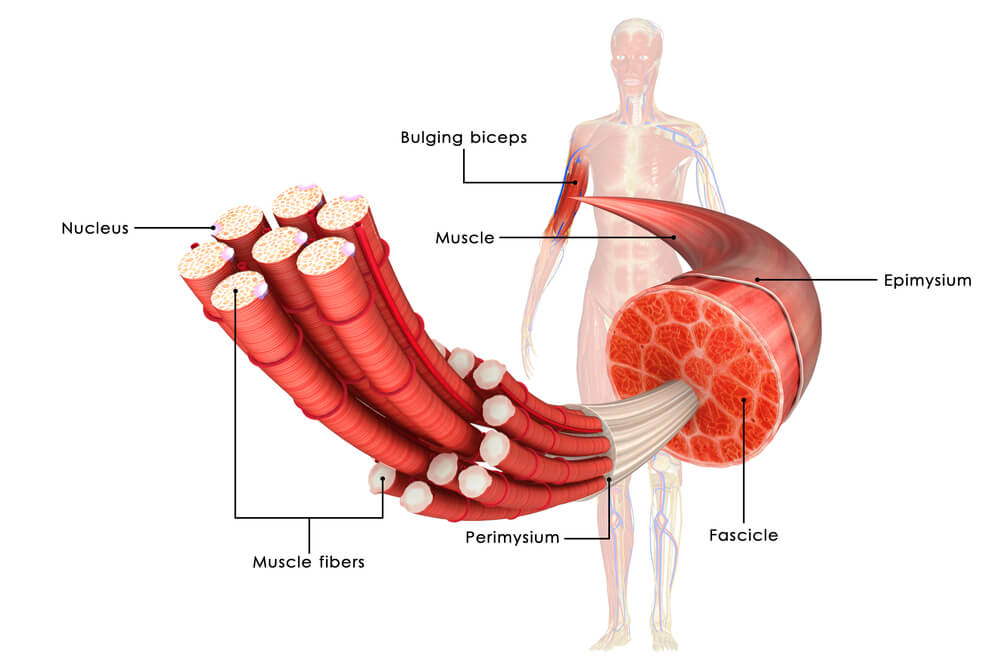-
Focus on Volume – Not Dead Weight
Let’s use bench pressing as an example. If you can bench press 250 lbs. for two repetitions, you’ve moved 500 lbs of volume. If you can bench 50 lbs. for ten repetitions, you’ve also moved 500 lbs. of volume. But which one of these sets provides you a better route to bigger muscles?
The fact is that your muscles will only be bigger when you can move a greater ‘volume’ of weight. For example, if three months from today you can bench 80 lbs for ten repetitions, you’ll have moved 800 lbs. of volume.
That’s a big 300-pound jump up from the 500 lbs. you’d have moved using 50 lbs. of weight.
Compare this to getting one more repetition with 250 lbs. – you’ll have moved 750 lbs. of volume.
Thus, your muscles will be slightly bigger if you can move 80 lbs. for 10 reps compared to 250 lbs. for 3 reps. But you’ll only really be aware of this if you’re focused on volume…
… Which is what most every person “working out” is NOT focused on.
-
Realize Muscle Building is Mathematical
 Building muscle successfully is not an open-ended free-for-all. It’s a closed-looped mathematical equation, just like a lot of things in life.
Building muscle successfully is not an open-ended free-for-all. It’s a closed-looped mathematical equation, just like a lot of things in life.
Here’s what that means. If you bench press that 80 lbs. for 10 repetitions (800 lbs. volume) for three sets, you’ll have moved 2,400 lbs. of volume. Assuming you take 30 seconds to do each set and rest 3 minutes between sets, you’ll have moved that big volume within 7 minutes, 30 seconds.
If sometime in the future you can shorten your rest time to one minute between sets, you’ll move the same volume in 3 minutes and 30 seconds.
… And your muscles will be slightly bigger because of it.
-
Realize that Weekly Workouts might be Too Often
If you did that bench pressing workout today, you’ll have torn down the muscles of your chest, shoulders, and arms.
Those muscles won’t get bigger until that damage has been recuperated. Not only that, but some compensatory tissue needs to be added so you can be stronger on your next workout.
How long does that take?
Everyone assumes it will take more than a couple days and less than a week. But just because the world’s workout enthusiasts and “trainers” assume this doesn’t make it correct.
Your muscles will recuperate and get stronger in their own time. They don’t know what the calendar date is and they certainly don’t care about the day of the week.
If you work the muscle again at any time prior to it reaching ‘compensatory recuperation’, it won’t get any bigger. Therefore, taking more than a week between working each muscle can actually speed up your progress.
-
Realize Muscles Need to be Coaxed – not Forced
Look around inside gyms the world over and you’ll see guys trying to ‘force’ their muscles into growth. This can be counterproductive even when we’re young.
It can be positively disastrous once we’re over the age of 40.
Building muscle does demand hard work. But the fact that successful muscle building requires hard work doesn’t mean that unbridled hard work leads to greater success.
There’s a balance to this. That balance is maintained with fine-tuned adjustment to the pre-mentioned time, volume, and rest days between working each muscle.
-
Maximize Your Endogenous Muscle Building Hormones
Once we’re over 40, we need to be strategic in order to maximize our anabolic and youth hormones.
Examples of anabolic hormones are testosterone and IGF-1.
An example of a ‘youth hormone’ is human growth hormone (HGH).
There are antioxidant supplements, like astragalus, that have been shown to boost testosterone over time.
There are techniques like intermittent fasting, and supplements such as GABA, that have been shown to enhance growth hormone release.
When techniques and supplements like these are successfully added to the four previous tips mentioned, there’s a synergistic effect…
… And bigger and stronger muscles over the age of 40 become nearly inevitable.
If you’re now realizing the potential you have for creating your dream body over the age of 40, you’ll love our FREE report: ‘Muscle over 40’
It has even more tips and tricks for becoming better over 40 than you ever were while under 30.





 Building muscle successfully is not an open-ended free-for-all. It’s a closed-looped mathematical equation, just like a lot of things in life.
Building muscle successfully is not an open-ended free-for-all. It’s a closed-looped mathematical equation, just like a lot of things in life. If you’d told me in my 20s that I could be leaner and better built in my 50s than I was then, I wouldn’t believe it. Now it’s happening.
If you’d told me in my 20s that I could be leaner and better built in my 50s than I was then, I wouldn’t believe it. Now it’s happening.